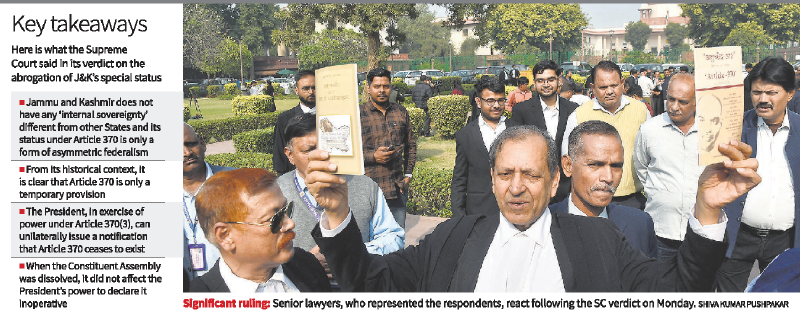ForumIAS announcing GS Foundation Program for UPSC CSE 2025-26 from 19 April. Click Here for more information.
ForumIAS Answer Writing Focus Group (AWFG) for Mains 2024 commencing from 24th June 2024. The Entrance Test for the program will be held on 28th April 2024 at 9 AM. To know more about the program visit: https://forumias.com/blog/awfg2024
Source: The post is based on the article “Supreme Court upholds repeal of J&K’s special status” published in “The Hindu” on 12th December 2023
Why in the News?
The Supreme Court in a unanimous ruling upheld the abrogation of Article 370 of the Constitution, which had conferred special status on the erstwhile State of Jammu and Kashmir.
What is Article 370?
What was the case before the Supreme Court?

1) In 2019, Parliament passed the Constitution (Application to Jammu and Kashmir) Order, 2019. The order effectively abrogates the special status accorded to Jammu and Kashmir under the provision of Article 370.
2) Further, the Parliament has also passed the Jammu and Kashmir (Reorganisation) Bill,2019. The bill bifurcated the State into two separate union territories of Jammu and Kashmir(with legislature) and Ladakh (without legislature).
3) A petition was filed in the Supreme Court challenging the abrogation of Article 370 and bifurcation of the state of Jammu & Kashmir into two Union Territories.
What is the Supreme Court verdict on this?
1) Abrogation of Article 370 was legal: The court upheld the power of the President to abrogate the special status of Jammu and Kashmir under Article 370 of the Constitution.
2) Article 370 is temporary: The Court held that Article 370 was always intended to be a temporary provision and not a permanent feature of the Constitution.
3) No internal sovereignty: The Court rejected the argument that Jammu and Kashmir had any internal sovereignty after its accession to India.
4) J&K always been an integral part of India: J&K has always been an integral part of India. The court cited Section 3 of the J&K Constitution itself, apart from Article 1 and 370 of the Indian Constitution.
– Section 3 of the J&K Constitution says that the State of Jammu and Kashmir is and shall be an integral part of the Union of India. While, Section 147 of the J&K Constitution prohibited any amendment to Section 3.
5) Action of abrogation taken under President’s rule: The petitioners argued that the government acted illegally by taking irrevocable action regarding Article 370 while Jammu and Kashmir was under President’s rule (Article 356).
– However, the Supreme Court ruled against this argument. The court relied on the 1994 Bommai judgment, which states that the President’s actions are valid unless they are done with bad faith or are clearly unreasonable.
Read More about this point – President’s actions during State Emergency open to scrutiny: SC
Other Directions of Supreme Court
Restoration of J&K Statehood: The court directed the Union Government to expedite the process of restoration of statehood for Jammu and Kashmir (without the Union Territory of Ladakh). It also said that the Legislative Assembly elections should be held by September 2024.
Truth-and-Reconciliation Commission: The court ordered the establishment of a Truth-and-Reconciliation Commission to address human rights violations both by state and non-state actors in Jammu and Kashmir since the 1980s.
UPSC Syllabus: Polity




